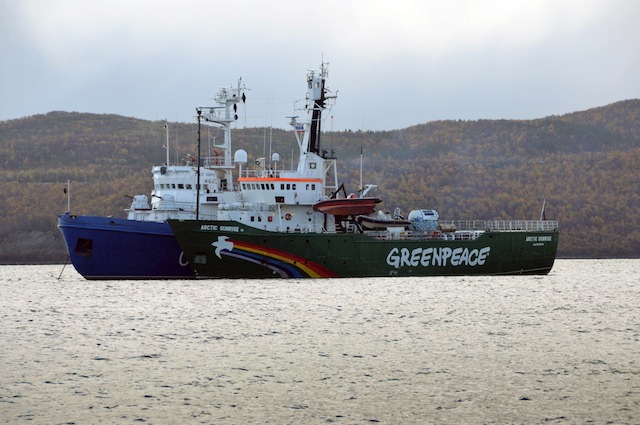SUMMARY
This is AI generated summarization, which may have errors. For context, always refer to the full article.

MOSCOW, Russia – A Russian court on Thursday ordered eight Greenpeace activists, most of them foreigners, to be detained for two months over a protest on an Arctic oil platform, defying calls from the Netherlands for their immediate release.
The Lenin district court in the northern city of Murmansk was expected to rule on whether to detain a total of 30 activists from the Dutch-flagged Greenpeace protest ship Arctic Sunrise who are being held on suspicion of committing piracy.
READ: Russia accuses Greenpeace activists of piracy
The court ruled that Polish activist Tomasz Dziemianczuk as well as David John Haussmann and Jon Beauchamp from New Zealand, Paul Ruzycki from Canada and Francesco Pisanu from France should be detained until November 24, Greenpeace wrote on Twitter.
The captain of the ship, US citizen Peter Willcox, was also given the same term. Willcox is a veteran Greenpeace activist who was captain of its ship the Rainbow Warrior when it was bombed by the French secret service in port in New Zealand in 1985.
The court earlier ruled that two Russians, Denis Sinyakov, a freelance photographer who works for Greenpeace and Greenpeace expert Roman Dolgov, should be detained for two months, Interfax news agency reported.
However one activist, Dmitri Litvinov, a Swede of Russian origin, was detained for only another 72 hours, Interfax reported, as the judge cited the fact he is the father of a young child.
The court was holding simultaneous hearings in six different rooms of the building into a total of 30 detained activists from 18 different countries.
None of the activists has so far been charged with a crime but are being detained during an investigation into their September 18 protest.
The Netherlands on Wednesday asked Russia for the immediate release of the activists and said it was considering legal action, the Dutch Foreign Minister Frans Timmermans wrote in a letter to the Dutch parliament.
‘This blatant intimidation won’t succeed’
Greenpeace International executive director Kumi Naidoo said in a statement that: “The Russian authorities are trying to scare people who stand up to the oil industry in the Arctic, but this blatant intimidation will not succeed.”
Russian border guards took control of the Greenpeace ship and locked up the activists after they attempted to scale state energy giant Gazprom’s Prirazlomnaya oil platform in protest at oil exploration in the Barents Sea.
The border guards, who had seized the vessel after descending on it on ropes from helicopters, then towed the ship to Murmansk, where the activists were held for questioning.
They have been held in detention in Murmansk since late Tuesday.
Greenpeace said that activists were brought into the court building in handcuffs. The handcuffs were taken off before they entered the courtroom cage used for defendants.
An Russian investigator told the court that Greenpeace was suspected of committing “piracy with the aim of seizing property by threatening violence as part of an organised group,” Greenpeace Russia wrote on Twitter.
Sinyakov, a former AFP and Reuters staff photographer, said in court that “all the accusations are baseless” and that “my weapon was my camera,” cited by Greenpeace Russia on Twitter.
Greenpeace said that the court justified the decision because Sinyakov does not live in Murmansk and travels abroad frequently.
“Our organisation is not a violent one, it is peaceful,” Dolgov said in a hearing broadcast online by RT television channel.
The Russian authorities by Thursday evening must either charge the activists, release them or apply for their detention to be extended without them being charged, Greenpeace spokesman Aaron Gray-Block said in an emailed statement.
He said the activists had all been interviewed with a lawyer and some with a diplomat from their country also present.
Russia has opened a case into piracy, although President Vladimir Putin took a milder stance on Wednesday, telling an international Arctic forum that “of course they are not pirates.”
This has raised hopes that even if they are eventually charged, it will be under a less grave article than piracy.
But Putin said the activists had broken international law by approaching dangerously close to the oil platform.
READ: Putin: Greenpeace activists ‘not pirates’ but broke law
Greenpeace denies that the activists committed piracy, saying that this only applies to ships and that they held a peaceful protest. – Rappler.com
Add a comment
How does this make you feel?
There are no comments yet. Add your comment to start the conversation.